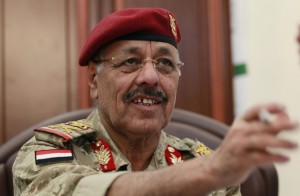
On Tuesday, General Ali Mohsen al-Ahmar, dubbed the most powerful military man in Yemen, opened up to CNN in a lengthy interview.
General Mohsen famously defected from the Regime in March 2011, breaking away from President Saleh after 30 years of loyal services.
Now a supporter of the Revolution, Ali Mohsen remains however a senior leader member of al-Islah, the Yemeni Islamic political party.
When asked what he thought should be done in Yemen, Mohsen said: “The general public in Yemen is seeking a transfer of power to the vice president…This is a principle that we must follow because there are agreements that sides have signed and it is compulsory that all sides agree on its specifics; not change its points.”
Interestingly the General is preaching to an implementation of the GCC proposal which was unilaterally signed by the Opposition before President Saleh once again fell short of honoring his promises.
Under the agreement, Saleh would transfer power to its Vice President, Hadi, who would in turn create a coalition government and organize the next presidential elections.
President Saleh would in exchange be granted legal immunity along with his close relatives and aides.
What is important here is that rather than advocate an immediate transfer of power under the Yemeni Constitution, Gen. Mohsen wants to return to the pre-Saleh departure proposal.
It sounds rather strange given that the Constitution states that if the President is unable to fulfill his executive duties, the VP would act as his replacement and arrange the next elections within 2 weeks. Why choose the longer and unpopular option?
Well for a start, Gen. Mohsen is a close friend and ally of Saudi Prince Nayef, the Head of the Yemeni Affairs Council in the Kingdom of Saudi Arabia. The Saudi have been from the get go the driving force behind the GCC proposal. Although the Kingdom recognizes the need for a change, it does not want to set a precedent in the region by allowing Yemen to drag Saleh to Court and trial him for his crimes.
Furthermore, by promoting the Saudi plan in the resolve of the Yemeni crisis, the General is proving the Kingdom that he still has a role to play in Yemen’s political landscape.
Well aware that the KSA will have to “anoint” the next Yemeni President, Mohsen is acting as a fervent and obedient vassal.
The General went on saying: “Our friends the Americans and the Europeans and the British and the GCC and Saudi Arabia are guarantors for its implementation.”
Quite cleverly here, Mohsen is positioning himself as a man of measure and poise, aware of the need of an international partnership in the region.
In regards to Vice President Hadi, the General is contrary to many of his fellow revolutionaries, full of praised for the political veteran. He said: “all sides agree on him and all respect him”.
In the past few weeks the Opposition and the Youth Movement have been openly critical of the Vice-President, accusing him of being a pawn in Ahmed Saleh’s battle for power. Hadi himself admitted that he had no real control over the situation as it was Saleh’s eldest son who was truly making the decisions. Either to deflect responsibility or to ensure a spot in the post Saleh era, Hadi is slowly distancing himself from the current Regime.
The General’s remark certainly signals the Saudi’s approval of Hadi as Vice President and maybe as the man able to reconcile all parties while the power transfer is taking place.
Finally and most significantly, General Mohsen stated in the interview that although Hadi was not truly in charge yet, he would in time be given the opportunity to lead Yemen as its true and constitutionally apointed acting President.
“In truth, he does not act with full authority as president of the Republic of Yemen, but in the future, he will practice his full authority.”
In one sentence, General Mohsen just condemned Ahmed Saleh. Everyone in Yemen knows that Ahmed Saleh has taken over since his father was taken to Saudi Arabia, hoping to maneuver his way to the presidential seat or at least to hold it long enough for Ali to return.
By saying that Hadi will in the future “practice his full authority” automatically implies that Ahmed will be forced aside.